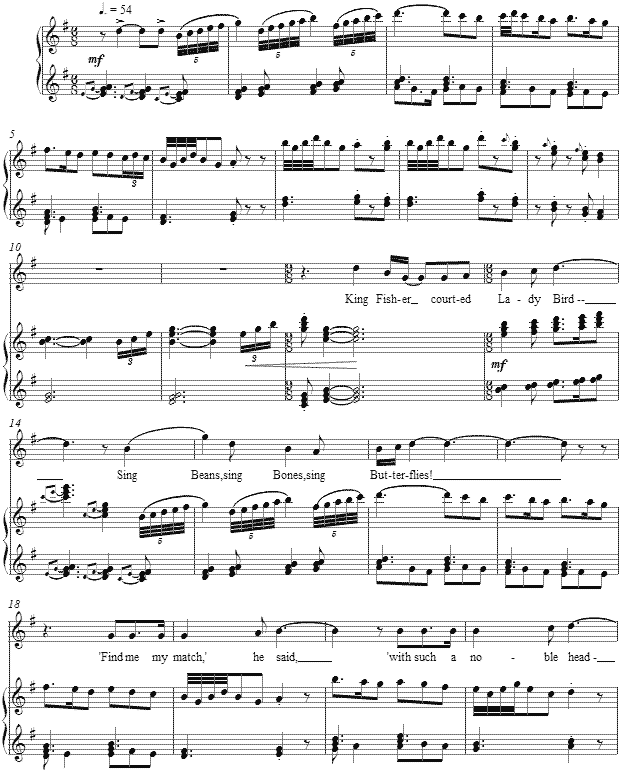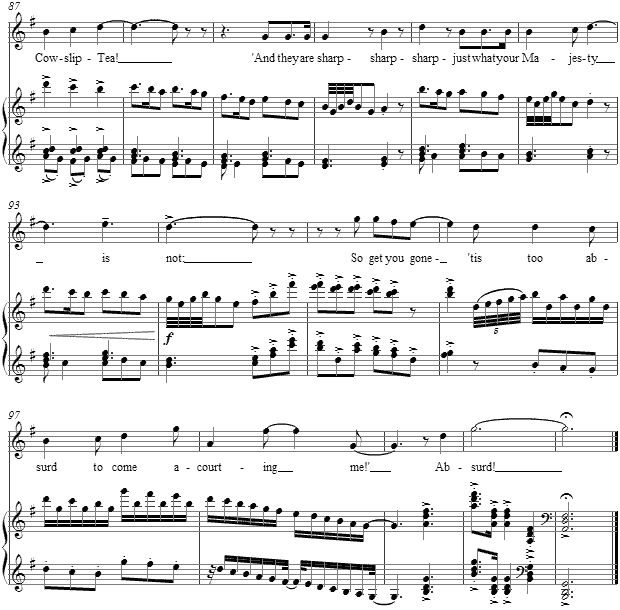Music and Texts of GARY BACHLUND
Vocal Music | Piano | Organ | Chamber Music | Orchestral | Articles and Commentary | Poems and Stories | Miscellany | FAQs
The King-fisher Song - (2009)
Lewis Carroll
for high voice and piano
King Fisher courted Lady Bird--
Sing Beans, sing Bones, sing Butterflies!
'Find me my match,' he said,
'With such a noble head--
With such a beard, as white as curd--
With such expressive eyes!'
'Yet pins have heads,' said Lady Bird--
Sing Prunes, sing Prawns, sing Primrose-Hill!
'And, where you stick them in,
They stay, and thus a pin
Is very much to be preferred
To one that’s never still!'
'Oysters have beards,' said Lady Bird--
Sing Flies, sing Frogs, sing Fiddle-strings!
'I love them, for I know
They never chatter so:
They would not say one single word--
Not if you crowned them Kings!'
'Needles have Eyes,' said Lady Bird--
Sing Cats, sing Corks, sing Cowslip-tea!
'And they are sharp--just what
Your Majesty is not:
So get you gone--’tis too absurd
To come a-courting me!'[ 5 pages, circa 3' 50" ]
Lewis Carroll
Having set so many texts of Carroll -- including libretti redacted from his Wonderland and Looking-Glass tales, the wonderful nonsense of Lewis Carroll has been a source of joy for me. So thinking on this text from Sylvie and Bruno Concluded recently brought a few gestures and motives to mind out of which this setting quickly sprung.
Written for high voice, the joyous notion of singing a repeated refrain "in the middle" of a text amused me. [ 1 ] The refrain, which rises to the highest part of the tessitura begins with each "Sing," an appropriate verb such that I notate a portamento up to it. This gesture became the opening quintuplets as the rise to each note of the tonic triad is a pianistic version of this as well. The 32nd note gestures as at measure six are ornaments to hearken back to a classic style, all the while some of the harmonies however sweet and triadic are most assuredly much more contemporary.
The last strophe repeats the notion of absurdity, for nonsense literature is rooted in our human joy with so much which might well be said to be silly. Even so, Carroll reminds us in a way to remain "sharp," in the same way that honing a knife is repetitious yet fully necessary to its purpose. Just so the seeming nonsense of rhyme and storytelling is also a pathway to joy as to laughter, without which life must be dour and less full than it can otherwise be.
The score for The King-fisher Song is available as a free PDF download, though any major commercial performance or recording of the work is prohibited without prior arrangement with the composer. Click on the graphic below for this piano-vocal score.
NOTES
[ 1 ] I was just beginning to say “I’m afraid I don’t know the words”, when Sylvie silently turned the map over, and I found the words were all written on the back. In one respect it was a very peculiar song: the chorus to each verse came in the middle, instead of at the end of it. However, the tune was so easy that I soon picked it up, and managed the chorus as well, perhaps, as it is possible for one person to manage such a thing. It was in vain that I signed to Sylvie to help me: she only smiled sweetly and shook her head. (from Lewis Carroll's Sylvie and Bruno Concluded, "Bruno’s Lessons")


